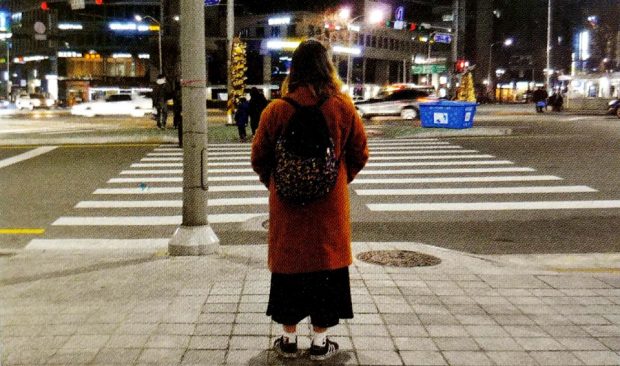한국계 미국인 24살 토플강사 유나가 살아가는 법
[아시아엔=서의미 기자] “한국에서 자랐다면 어떤 삶을 살았을지 궁금해. 부모님이 한국인이라 나 역시 한국에서 살았을 수도 있었거든.”
24살의 미국 국적자 유나가 한국으로 건너온 지 어느덧 1년 반이 됐다. 그녀는 학원에서 학생들에게 토플을 가르치고 있다. 유나는 많이 지쳐 있는 학생들을 바라보며 ‘내가 그들 중 하나였을 수도 있다’고 생각한다. 한국에서 성장했다면 유나도 한국의 유별난 교육시스템을 경험했을지 모른다.
유나의 부모님은 두 분 다-어머니는 이십 대, 아버지는 그보다 더 어렸을 때-미국으로 이민 가셨고, 그곳에서 결혼해 정착하셨다. 자녀들은 뉴욕에서 성장했지만, 어머니는 자녀들에게 한국인이란 뿌리를 일깨워주기로 마음 먹었다.
“정말 이상해. 문화적인 관점에서 보면 미국인인 건 분명하지만 여러 면에서 한국인의 기질도 갖고 있어. 굳이 따지자면 60%의 한국인?”
유나는 가장 좋아하는 음식 설렁탕을 ‘할머니’와 같은 음식이라 표현한다. 어머니의 설명 덕분이다. 어머니는 유나에게 유교 문화의 근간을 이루는 음식, 전통들과 다음 세대의 밑거름이 된 전 세대의 노고에 대해 들려주곤 했다.
어머니의 고국을 찾은 유나가 한국의 모든 것에 익숙해질 수는 없었다. 그러나 동양적인 외모를 지닌 유나가 서울에서 “넌 어느 나라에서 왔어?”라는 질문을 듣는 일만큼은 없었다. 미국에서 태어난 그녀가 미국인들에게 ‘자신도 미국인임을 상기시켜야 한다’는 것은 아이러니했다.
한국은 유나의 집이 아니다. 하지만 그녀는 한국사회에 큰 어려움 없이 녹아 들며 자신이 현재 어디에 있고, 또 어디를 향해 나아가야 할 지 깨달았다.
“이제는 세상을 다르게 바라볼 수 있어. 과거의 나는 미국인의 시선으로 세상을 바라봤거든.”?(번역 차은서 인턴기자)
다음은 영어 전문입니다.
Yuna has been in Korea, now, for a year and a half, teaching English at a hagwon (cram school) to young students. It’s the typical rigorous academy that prepares students for the TOEFL exam and they are visibly stressed. But that could have been her.
Back home in America, her Korean parents are a reminder that she could have been sitting in those same seats, worrying about English exams and undergoing the same difficult Korean education system.
But her parents both moved to the United States?her mother when she was in her twenties and her father as a child?where they would meet and marry. Their children would grow up in New York City, but Yuna’s mother was determined to pass down her Korean roots to her children. And most certainly, Yuna deeply identifies with her ethnicity.
“It’s weird. I think I’m fully American culturally, but at the same time, I am Korean in so many ways. I would say I’m 60% Korean; I joke that I have the most Korean taste-buds in the family.”
Her favorite Korean dish is seolleongtang (ox bone soup), which she amusingly adds is like a “grandma’s” food. That was how it was with being brought up by her mother though. Having immigrated to America as a young woman, Yuna’s mother often reminisced of the life she left behind in Korea, talking about the food and traditions that were part of the Confucius society; the importance of respecting one’s elders for their hard work which eventually became the foundation for the future generation.
Arriving in Korea, Yuna was surprised to see that the Korea she had come to know through her mother wasn’t quite the same. People weren’t as eager to respect the elderly as she had expected. She saw poor halmonis (Korean for grandmothers) sitting on the station floor selling the small amount of vegetables they had all day.
People just went their own way, ignoring the women, refusing to buy anything. It was hard to understand why they would leave the grandmothers to struggle like that.
So, some parts to the country were difficult to get used to and still other aspects were completely jarring, but it was also refreshing, in a way, to be able to mix in comfortably in a place where she is a foreigner.
Yuna’s Asian eyes and skin color brought no questioning glances in Seoul?whereas in New York, people would push “No really, where are you from” to her face. It didn’t make sense to have to remind those Americans that she, too, was from America. Korea is not home.
But in how she has been accepted and through the experiences she has had, Yuna has been given a healthy dose of perspective of her current position and possibly a better idea of future steps: “I view the world a lot more differently now. Before I saw the world through a very American lens.”






